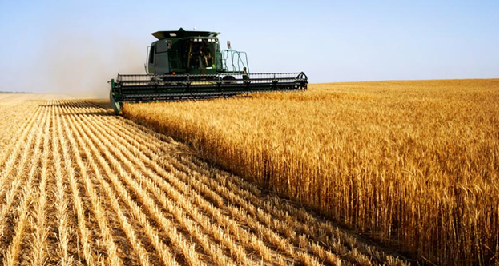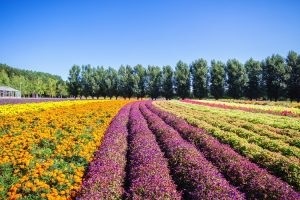
For Ethiopia, where agriculture is the basis of its economy, this is the main harvest season. More recently, summer irrigated wheat cultivation has begun. This season will be given a great place in the effort to increase the agricultural production and productivity.
It is known that extensive preparations have been made for the 2023 production season as a country in an effort to increase the production and productivity of the agricultural sector. For this reason, although there have been complaints about the supply of fertilizers in some regions, the government has subsidized 21 billion Birr for the purchase of fertilizers for the production season.
During the harvest season alone, 17.5 million hectares of land was covered with seeds, and the crop harvesting has begun earlier. The information received from the Ministry of Agriculture indicates that the work has been intensified. In the current main harvest season, it is expected to fulfill 101% of the plan via harvesting crops from the abovementioned land seeded in the country.
Regarding the crop harvesting, Kebede Lakew, Executive Director of Public Relations and Communication of the Ministry of Agriculture, told Ethiopian Press Agency that the work of early harvesting of crops, particularly in the lowlands and highlands, has continued to be strengthened. Thus, until the first week of December, the regions have harvested 9.6 hectares with traditional harvest method and over 844, 922 hectares with combiner, for a total of 10.8 million hectares of land.
When the product is harvested in a traditional way, it will be stored and threshed later on. If it is with a combiner, it will be threshed immediately. Out of the crops harvested from 10.5 million hectares of land that of from 4.1 million hectares has been threshed. From this, 114,239,964 quintals of production was obtained. Kebede said that the work of harvesting the crops has continued, but most of the crops harvested in the traditional way have not yet been threshed; it is still piled up.
As to him, there are some immature crops; there may be unseasonal rain; based on the weather forecast data provided by the National Meteorology Institute, it is recommended that the farmers, the management, the general public, and the development station workers have to strengthen the work of harvesting and putting in the barns and the work is underway accordingly.
Kebede explained that regarding preventing harms occurred from pests, unseasonal rains, grasshoppers, and other pests; recommendations have been given to the farmers and agricultural experts before the damage occurs. He mentioned that the weather is sunny, dry and windy and the farmers are doing well in harvesting the crops.
Harvesting work is being done intensively in the regions. Amhara Region Agricultural Office has announced that the work of collecting crops in the region has continued. Amsalu Gobaw, Head of Public Relations of the Regional Agriculture Bureau, mentioned that 5.1 million hectares of land was covered with crops in the 2023 harvest season, out of which 160 million quintals are planned to be harvested.
As it is the harvest season, 3.5 million hectares of crops have been harvested in the region so far. This will be about 68% of the expected harvest. The product harvesting process is done in two ways; one is the traditional, and the second is the way the product is harvested using modern technology.
The Bureau Head mentioned that it is the traditional way that the farmers cooperate with each other to harvest the produce by their own efforts. For the harvesting process carried out by the modern way by using a combine harvester, he explained that the region has deployed 29 combiner machines and is doing a lot of work.
Amsalu mentioned that these modern product harvesting machines are doing extensive work, especially in East Gojam, West Gojam and North Shewa areas. He stated that the produce of 7,200 hectares of land in the region was collected by combine harvesters.
As to him, the region has not gone through harvesting the produce it cultivated during the harvest season as planned. The other will be collected at the rate of growth of the product. Next, there will be harvest until the end of January and beginning of February. Various crops including pulses are harvested during this season.
The Bureau Head further said that the farmers are coordinating all their capabilities and working on harvesting the crops. Therefore, the regional agriculture office announced that it is providing the farmers various support as much as their capacity allows. The farmers have continued to strengthen their agricultural work despite the current security situation in the region, he said.
As per the explanation of Amsalu, the region has been doing various activities to achieve better results in organizing and coordinating the farmers and using technology. For this, the office is providing support using several strategies. The agricultural experts in every area are supporting the farmers by reaching out to the farmers in the areas where there is no security problem in the region.
Various agricultural information is being made available to the farmers through the media. As agriculture is a year-round activity, appropriate information is being made available to the farmers by connecting it with the agricultural calendar in a timely manner regarding activities such as crop harvesting, irrigation, taking care of and monitoring the seedlings so that they are not damaged or uprooted.
Recalling that in the past, various supports were given in terms of using new technologies that can support and improve the agricultural work; he said that this support has recently decreased compared to last year due to the security problem in the region. He added that in the past, they used combiners from the Oromia region to work in coordination with other neighboring zones, but currently, such cooperation has decreased. Unseasonal rains and crops’ consuming birds had also occurred in the region so that prevention work has also been strengthened. The office has done everything it should have done, he said.
“According to the Agriculture Bureau, it is working to achieve the plan that says that the agricultural work should not stop. Whatever happens, agriculture is like the work of the Red Cross. Just as the Red Cross saves a person who is about to die and has an accident, the work of agriculture as a food producer does not stop.” He announced that it is being done with the belief that it should continue.
As to Amsalu, identifying what the farmers want in terms of mechanization; various machines will be provided based on the needs of the farmers. Whether it comes from Oromia, South, or Benishangul Gumuz and if there are favorable conditions, it will be alright.
Amsalu pointed out that after the invasion of birds and locust swarm, an independent expert group has been set up and information is being collected regarding the amount of damage caused by the unseasonal rain and the birds’ flock and locust swarm. Currently, it is not possible to say about the amount of damage caused by the birds or the locust swarm.
Amsalu said that the Agriculture Bureau has an emergency communication plan to reduce such incidents. For example, there is an independent plan to be prepared in case of locusts, floods, and droughts. On top of that, he said, the public relations are consistent and provide information that can keep the society from getting confused.
In relation to the loss of crops, Amsalu said that most of crops produced by the farmers under harsh situations of mud and cold, rain and sunshine are wasted. According to studies, 33 percent of the crops produced by the farmers are wasted. In particular, a grain of cane crop is cut and falls in the opening parts of the ground. Besides, it is also wasted when it is threshed by cattle. So everyone should work together to reduce this waste. It is necessary to harvest and market the crop carefully, without waste.
Amsalu stressed that if the products and wealth obtained through hard work cannot be used properly, neither the farmers nor the urban dwellers will benefit. Therefore, the media should explain and inform the farmers about the economic benefit of preventing production loss.
He mentioned that Amara region has very large rivers that flow throughout the year, and announced that the farmers should use these underground and surface waters to replace the production they may lose and produce more than that. It is appropriate and necessary to do this important, vital and unstoppable agricultural work in cooperation and coordination.
BY BACHA ZEWDIE
THE ETHIOPIAN HERALD TUESDAY 26 DECEMBER 2023





